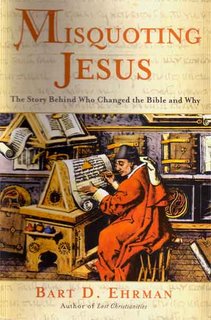
I was surprised when I put this book on hold at the library and it turned out to have 7 people ahead of me on the list. The vast majority of non-fiction books, especially those about studies of Christianity do not tend to have the same kind of pull that books like the "Left Behind" or "Da Vinci Code" do. I figure this is an anomaly caused by the extreme popularity of Da Vinci right now. Otherwise, a book that talks about how the New Testament is in fact subject to human error might not get such great play.
Before anyone gets excited though, let me say that this book doesn't tell you anything new. It's a well-written introduction to the area of textual criticism for the layman, and it doesn't really tackle any of the major issues of that area of study. The bulk of it is just him talking about the categories of textual errors that occur and why they occur. Well, I guess some people actually don't know that much about it, so let me give a little history.
No one on Earth (at least, that we know of) has any of the original manuscripts of any of the books of the New Testament. Nor do we have any first-generation copies (that is, original copies of those first manuscripts), nor anything that was copied within 100 years of the originals. And there are precious few copies that go back before the time of an "orthodox" church. So we have the fewest copies from the earliest period and more as time goes on (up to today, when there's practically a bible for every person on the planet). Christian scholars have known all along that there are many variations among the copies of the books we have. As Ehrman puts it, there are more variations than there are words in the New Testament.
To bring it to the point, the idea of the Protestant church is that the Bible, being the divinely inspired word of God, serves as the infallible guide for belief. The problem, of course, is that the New Testament was written and re-written by human beings. Those who claim that the King James Version (or any other) is the "right" version are basing their beliefs on flawed translations of flawed copies and flawed translations. There is no version of the Bible today that can safely be said to present the unaltered texts as they were originally written.
Ehrman details exactly how such mistakes and deliberate changes were made, why we know they were made and how we can try to reconstruct the original wording. This is not a science unique to Ehrman, nor is this some kind of fringe movement. The field of textual criticism was founded almost 500 years ago when Protestant scholars tried to show validation of their religious beliefs by working backwards to the purest form of the New Testament possible. It has become fairly advanced at this point and involves scientific methods of reconstructing the texts, as well as using established criteria to determine what the older, more original version of a text was.
Ehrman discusses the different kinds of changes that were made, including the accidental and deliberate changes. An example of accidental change would be when a scribe copied a line over again without realizing it or miscopied a word (or miswrote the actual letters, something that happens when you're copying a language that's not native to you). He also points out some deliberate changes, those where the scribes were making a passage make more sense to themselves grammatically and theologically.
Ehrman's definitely a good writer, and I've enjoyed reading his books before, so if you're an Ehrman fan, it's definitely worth it. If you don't know anything about textual criticism, this is as decent a place to start as any. But, like I said, if you've read a dozen books that study the New Testament, you've more than likely heard everything that's said in this book. But if you're not that knowledgeable, read it!
No comments:
Post a Comment